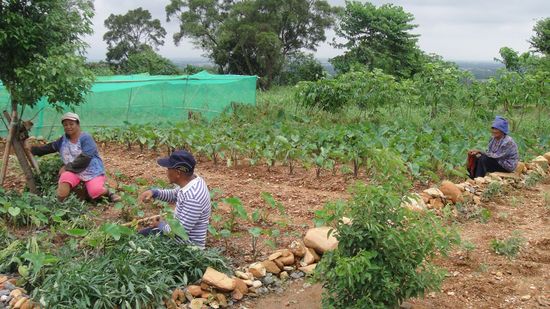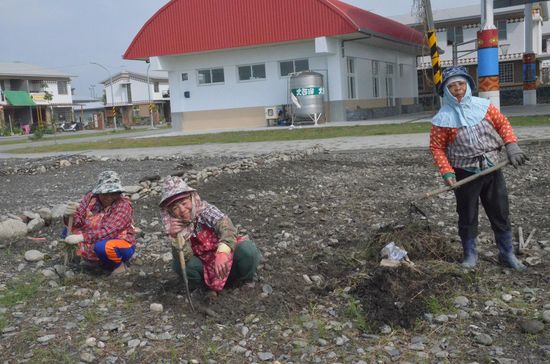


Soul Farms in Permanent Housing Communities Become A New Wonderland For Residents
2012-12-11

The indigenous people that were resettled in permanent housing communities after Typhoon Morakot has found it difficult to leave their farming tradition behind. The government has now allocated land for "Soul Farms" that elderly people and women leaving in the permanent housing communities can cultivate. Farming not only provides a way to relax and bond with the land, the growing of traditional crops is also a way of preserving indigenous culture.
At the Dalai tribal village meeting hall of the Changzhi Baihe community in Pingtung County, “VuVu”(a.k.a. the elderly in Paiwan tribal language) and her two sisters were busy weeding their new Soul Farm while the soil was still damp and loose after the rain. "I am going to plant yams and my sisters are here to help. Thanks to the government, we can now do more than just sit at home and watch TV all day. We can turn the soil and plant things now." VuVu said cheerfully. She then shouted at her 5-year old grandson playing nearby: "Don't step on the peanuts that our neighbors just planted!"
The people of the indigenous tribes are very close to the land and Mother Nature. Farmland or spare plots of ground near their homes are often used to grow cash or traditional crops. For the indigenous people, farming for a living or for self-sufficiency is a natural part of their everyday life. After Typhoon Morakot, the indigenous people were resettled in permanent housing communities because their homes were destroyed or their original homes were in unsafe locations. The wrench of relocation and change in living environment meant many people felt ill at ease. The elderly and women in particular spend much of their time in the permanent housing. As it was too far for them to farm their old lands, they could not only sow seeds in whatever space they could find around the permanent housing and wait for the harvest. The tribal villages have therefore repeatedly submitted requests for farm land at the permanent housing communities through a variety of different channels.
The government understood the indigenous people's love for the land and desire for farm land. Unused land within the permanent housing communities as well as leased Taiwan Sugar or public land nearby was therefore provided to the tribal communities as "Soul Farms". These soul farms could be used by the indigenous people in their spare time to plant non-cash crops for everyday use or traditional crops such as millet, red quinoa, taro and pigeon pea. The farms not only helped to preserve indigenous culture but also allowed the indigenous people to relax through farming. Soul farms have now been set up for the Shanlin Da-ai community in Kaohsiung City as well as the Rinari, Changzhi Baihe, Xinlaiyi and Ulaljuc communities in Pingtung County. Personal plots or common plots have now been allocated based on tribal consensus. Soul farms are also being developed in response to the needs of the local residents in other permanent housingcommunities.
Haucha villagers at Rinari harvest yam leaves

The elder and women of the Changzhi Baihe community busy with soil preparation and weeding






